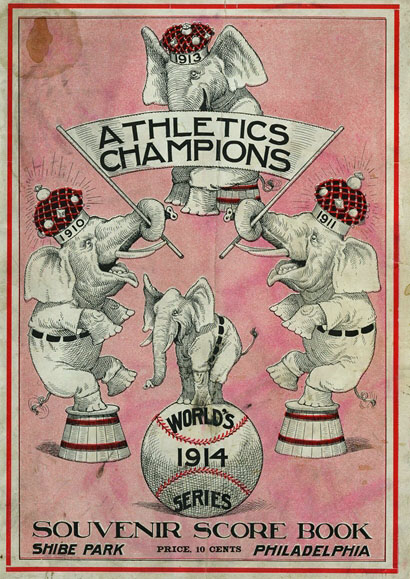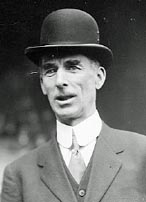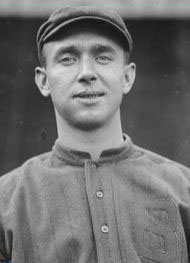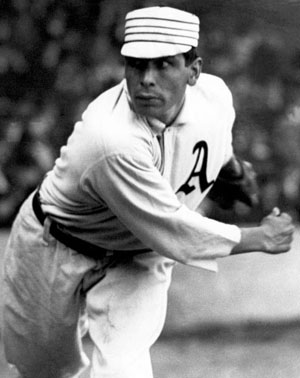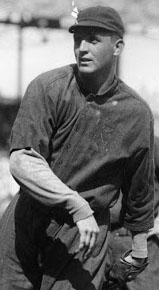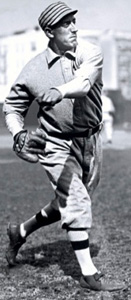|
Pivotal World Series Plays
Stallings Outmanages Mack
1914 World Series - Game 2: Boston Braves @ Philadelphia Athletics
Connie Mack's Philadelphia Athletics won 99 games and lost 53 to earn a chance to win their fourth World Series in the past five years. Their opponents were the upstart Boston Braves, who were in last place 15 games off the pace after losing both games of a July 4 doubleheader. All the "Miracle Braves" led by George Stallings did was go an amazing 68-19 the rest of the season to win the pennant by 10.5 games.
Like Mack, Stallings managed from the dugout in a business suit.
To put Stallings' achievement into perspective, the Braves had not enjoyed a single winning season since 1902 and had not finished within 50 games of first place since 1908.
Odds of the A's winning the Series ranged from 2 to 1 to 10 to 7. Philadelphia bettors offered 10 to 1 that the Braves would not win four straight.
Athletics Confident
The Athletics were quite confident going into the Series. As an example, Mack told his Game 1 starter, Chief Bender, to go to Boston and scout the Braves. When Connie saw Bender the next day, he asked him why he wasn't in Boston. "What's the good of looking over a bush league outfit?" Chief growled.
Postseason novice Dick Rudolph easily outpitched veteran Chief Bender 7-1 in the opener at Shibe Park in Philadelphia. One sportswriter gushed that Rudolph "pitched one of the most remarkable games in the history of the sport. … He used a slow ball, a curve, his spitter, and not once during the game did the Philadelphia really threaten."
When Bender was knocked out of the box in Game 1, he came to the dugout crestfallen. Mack asked him facetiously, "Pretty good hitting, isn't it, for a bush league team?"
Stallings Developed His Pitchers
For Game 2, Stallings chose Bill James, who won 26 of 33 decisions during the season. Mack went with lefty Eddie Plank (15-7) to even the Series.
Stallings had developed James into a reliable starter. OF Larry Gilbert recalled, "Stallings could stand almost anything but bases on balls. They drove him crazy. There was a time when James was so wild he couldn't last two or three innings. Tyler was inclined to be wild, too. Well, Stallings rode them so hard about bases on balls that he would go wild on the bench any time they got the count 2-2 on a hitter. He would curse them and rave. Even when they got the hitter out, he would ride them for not getting those two pitches over the plate. Stallings had sold himself on the belief that even in batting practice when a hitter knows the pitches are coming over the plate with nothing on them, odds are he will foul off a couple, bounce some more to the infield and lift two or three flies.
"I was on the bench most of the time, getting in as a pinch-hitter some, and sitting there day after day, I began to realize Stallings' tactics. In his own mind, and in his pitchers' minds, he simply made the 2-2 count as bad, as fatal, as walking a man. What Stallings did was just move up the 'danger stage' one pitch. He harped on that so much during the stretch drive that the pitchers were always trying to get the first ball across the plate. If not the first one, then the second one for sure. It changed a fair trio (James, Rudolph, and Lefty Tyler) into a great trio."
Goose Eggs into Fateful Ninth
Both James and Plank pitched magnificently, and the game was scoreless heading into the 9th, which would prove to be the pivotal inning of the Series. It still stands as one of the most interesting final innings of any World Series because of the actions and inactions of the two managers and a veteran infielder and key plays made by a substitute third sacker.
To start the inning, the superstitious Stallings made a change in the first base coaching box. He sent his "human good-luck charm," reserve outfielder John Devore, to coach first base in place of Rudolph.
Strunk Misplays Fly into Double
SS Rabbit Maranville grounded out to start the inning. The next batter was 3B Charlie Deal. He had platooned with Red Smith at the hot corner during the season. But down the stretch Smith had taken over the job until Charlie broke his ankle in the last game of the regular season.
A's skipper Connie Mack said that he regretted the injury to Smith "as he wanted the Athletics to meet the Braves at their best." Mack would come to regret that comment when Smith's replacement sparked the Game 2 win.
Deal smacked a fly to deep right-center field. CF Amos Strunk had been compared to the great Tris Speaker for his ability to track down fly balls. But he misjudged the ball or lost it in the sun. He started in before changing direction and that was enough for the ball to drop for a double.
Deal almost ruined the good play he had just made. With James at the plate, Charlie wandered too far off the bag as the pitch was delivered. When C Wally Schang fired the ball to SS Jack Barry covering second, Deal took off for third. Barry took the peg but didn't throw to third because the runner was directly in line with 3B Frank Baker covering the bag.
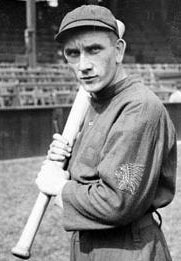 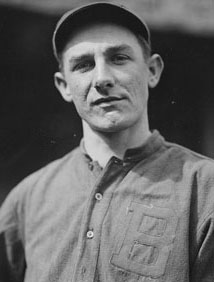 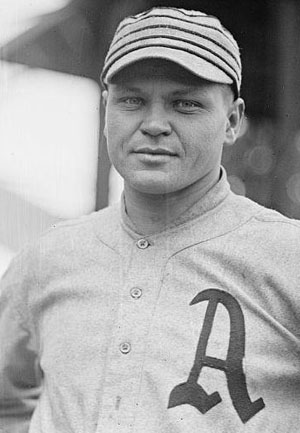 L-R: Rabbit Maranville, Charlie Deal, Amos Strunk Stallings now had a decision to make. Should he pinch hit for James to increase the chance of scoring the go-ahead run? Or let James stay in the batter's box so he could continue his two-hit shutout pitching in the bottom of the inning?
Stallings' Platooning Pays Off
The Boston manager let James hit, but he struck out for the fourth straight time. That left it up to RF Leslie Mann with two out. He was one-for-four against Plank, a line drive single to center in the 5th. Mann, a right-handed batter, was playing against lefty Plank as part of the platoon system Stallings had installed during the 1913 season to wring the maximum production from his roster. George platooned all three outfield positions. So he had started lefty hitter Herbie Moran in RF in Game 1 against the righty Becker and Mann the next day against Plank.
While James was hurling a two-hitter, Plank had allowed six hits and walked four. Mann was the 38th batter he faced compared to James's 24 in eight innings. So the 39-year-old Philly pitcher was tiring.
Mann slapped a liner that 2B Eddie Collins "could not reach though he leaped four feet into the air and landed in a shapeless heap on the outfield turf." Deal scored easily with the go-ahead run.
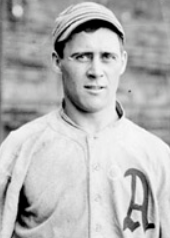 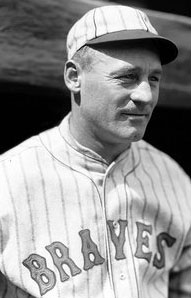 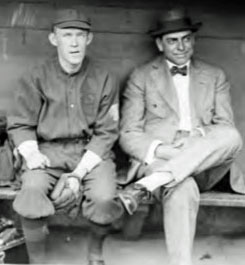 L-R: Wally Schang, Leslie Mann, Johnny Evers and George Stallings, Sensational Double Play Seals Win
The A's didn't die without a fight. After issuing only one free pass in the first eight innings, James walked Barry on four pitches. Then, after striking out Schang, Bill moved the tying run to 2nd by walking PH Jimmy Walsh. That brought up Eddie Murphy, a lefthanded batter that Mack platooned in right field with Walsh. Murphy excited Philly fans by smacking a shot through the box that normally would tie the game. But veteran 2B Johnny Evers, whom Stallings had appointed team captain when he was obtained in a trade with the Cubs in February, had moved SS Maranville just to the right of the second-base bag for Murphy. So Rabbit was in the right place to field the ball, avoid the lumbering Walsh coming from first, step on the base, and fire to first for "an utterly impossible" game-ending double play.
In his nationally-syndicated newspaper column on the Series, Ty Cobb praised the Braves' platooning. "That game was won by Stallings' shrew shifts. He put Mann and Cather into his batting order in place of Moran and Connolly, to get two right-handed batters against a southpaw, and how well it worked the result showed."
After winning the first two games on the road, the Braves continued their momentum in Boston, taking the next two games to sweep the mighty A's.
References
Bury Me in an Old Press Box, Fred Russell (1957) The Miracle Braves of 1914, Society for American Baseball Research ( |
|||||
